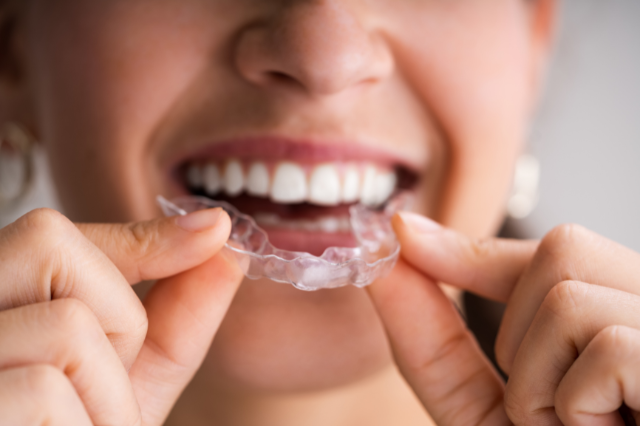Should I Wear a Night Guard?

A night guard, also known as a dental splint or bite guard, is a device worn over the teeth to prevent damage from teeth grinding and jaw clenching while sleeping. These habits, known as bruxism, can lead to a variety of oral health issues including tooth pain and sensitivity, jaw pain and tension, and even tooth loss. Within this blog post, we’ll go into detail on why you should wear a night guard and how you can get the best one for you.
Why should you wear a night guard?
There are many reasons why someone should wear a night guard, the most popular including:
Protection of teeth from damage caused by bruxism (teeth grinding and jaw clenching)
Reduction of tooth pain and sensitivity caused by worn enamel
Prevention of small fractures in teeth
Alleviation of jaw pain and tension caused by bruxism
Improved overall quality of sleep by reducing noise from teeth grinding and jaw clenching
Redistribution of pressure in the jaw, reducing pain and tension
Prevention of tooth loss caused by advanced stages of bruxism
Providing a barrier to prevent tooth to tooth contact and reducing tooth wear
Reducing headaches caused by tension in the jaw
Helping to prevent damage to dental restorations such as crowns and bridges.
One of the most significant reasons to wear a night guard is to protect your teeth from the damage caused by bruxism. Teeth grinding can wear down the enamel on your teeth, leaving them more susceptible to cavities and sensitivity. It can also cause small fractures in your teeth that can lead to more serious problems down the road. Wearing a night guard can help to cushion your teeth and absorb the force of the grinding, reducing the damage to your teeth.
Another reason to wear a night guard is to alleviate jaw pain and tension. Bruxism can cause pain and stiffness in the jaw joint (TMJ) and surrounding muscles, leading to headaches and neck pain. Wearing a night guard can help to redistribute the pressure in your jaw, reducing the pain and tension.
In addition to protecting your teeth and jaw, a night guard can also help to improve your overall quality of sleep. Bruxism can cause loud teeth grinding and jaw clenching, which can disrupt the sleep of both the person experiencing the bruxism and their partner. Wearing a night guard can help to reduce the noise and allow for a more peaceful sleep for everyone.
How to acquire a night guard
If you are experiencing any symptoms of bruxism such as teeth pain and sensitivity, jaw pain and tension, headaches or loud teeth grinding, you should talk with your dentist. They will be able to perform an exam and determine diagnosis, whether it be bruxism or not, and recommend a night guard or other appropriate treatment option.
There are different types of night guards available, such as custom-fit guards made by your dentist and over-the-counter boil-and-bite guards. The custom-fit night guards are more comfortable, durable, and effective than the over-the-counter ones found at your local drug store or Walmart, but also more expensive and take longer to receive. Overall, it is usually better to have a night guard made by a dentist to ensure that it is tailored to your specific needs and comfort.
Night guard care
It is important to clean your night guard regularly and properly to ensure that it is hygienic and remains in good condition. Cleaning your night guard every night will also eliminate the growth of harmful bacteria and eliminate any odors or discoloration. With the proper cleaning and care your night guard can last for several years.
Some night guard cleaning tips include:
Rinse the night guard thoroughly with cool water before and after each use to remove any saliva, food particles, and other debris.
Clean the night guard with a mild, unscented soap and warm water. Avoid using hot water, as it can warp the shape of the night guard. Use a soft-bristled toothbrush to gently scrub the surface of the night guard, paying special attention to any grooves or crevices.
Rinse the night guard thoroughly with cool water to remove all traces of soap. Shake off excess water and gently dry the night guard with a soft towel or let it air dry.
Store the night guard in a clean, dry place. You can place it in a case or bag that came with it or in a clean plastic bag.
Disinfect your night guard periodically by soaking it in a solution of water and a denture cleaning tablet or effervescent tablet. Follow the instructions on the product for the appropriate amount of time to soak. Rinse the night guard thoroughly with cool water before using it again.
Regularly visit your dentist to check the fit of your night guard and the condition of it. they may recommend professional cleaning or adjust it if necessary.
It's important to remember that you should never use hot water, bleach, or harsh chemical cleaners on your night guard, as they can damage the material and affect the fit of the device. Also, avoid leaving the night guard in direct sunlight or in a hot car, as this can cause it to warp or discolor.
In conclusion, bruxism, or teeth grinding and jaw clenching during sleep can lead to serious oral health issues and should be treated seriously. Wearing a night guard is an effective way to protect your teeth from the damage caused by bruxism, alleviate jaw pain and tension, and improve your overall quality of sleep.
Have questions? Contact Carolina Family Dental and we’ll be happy to help!